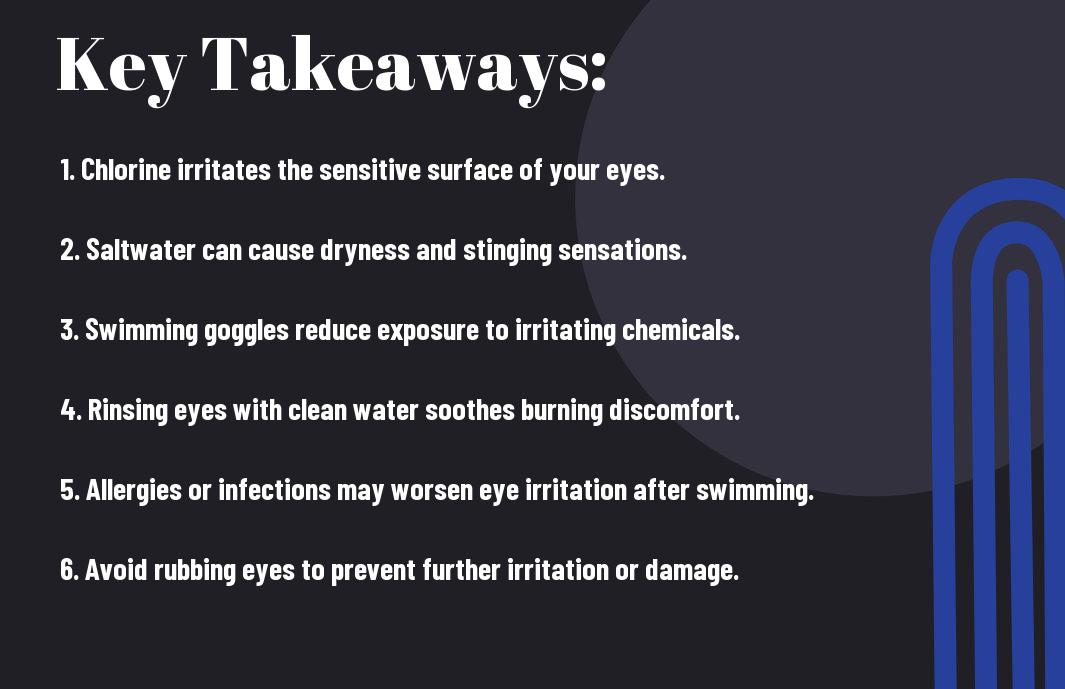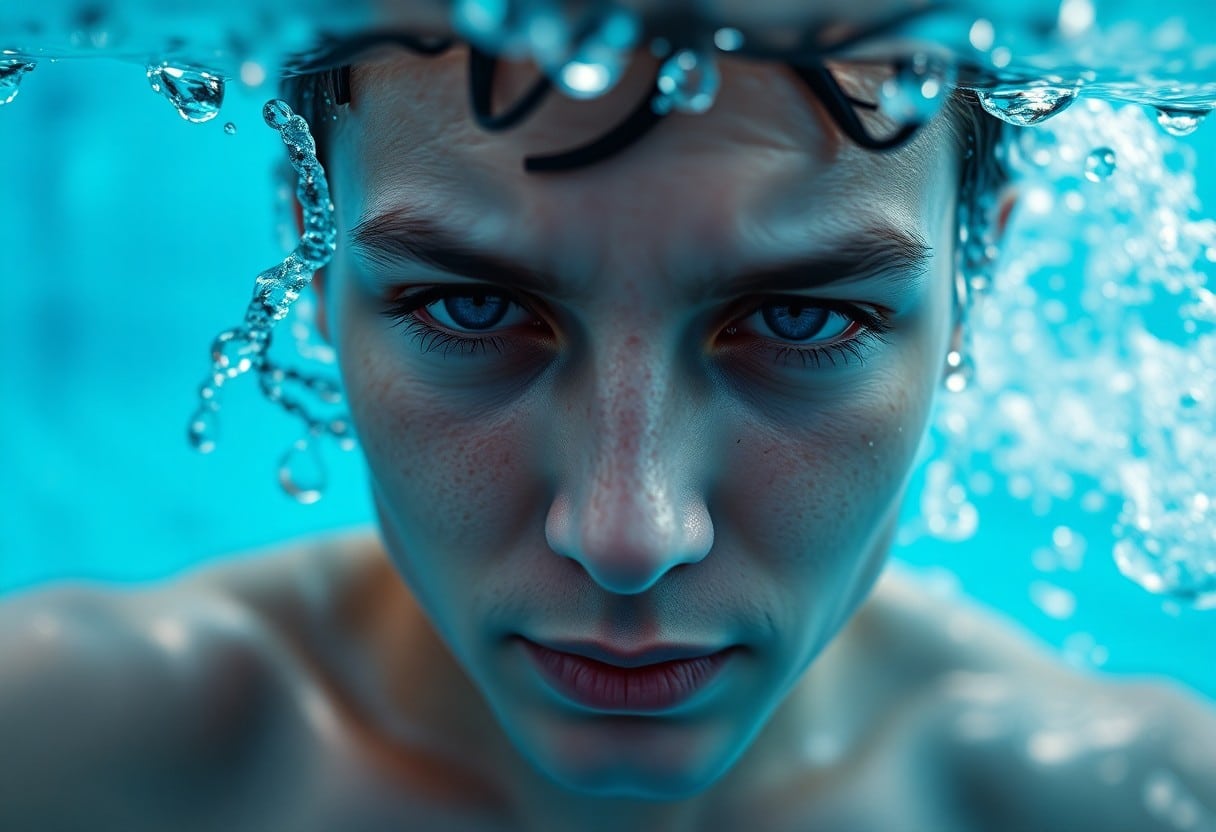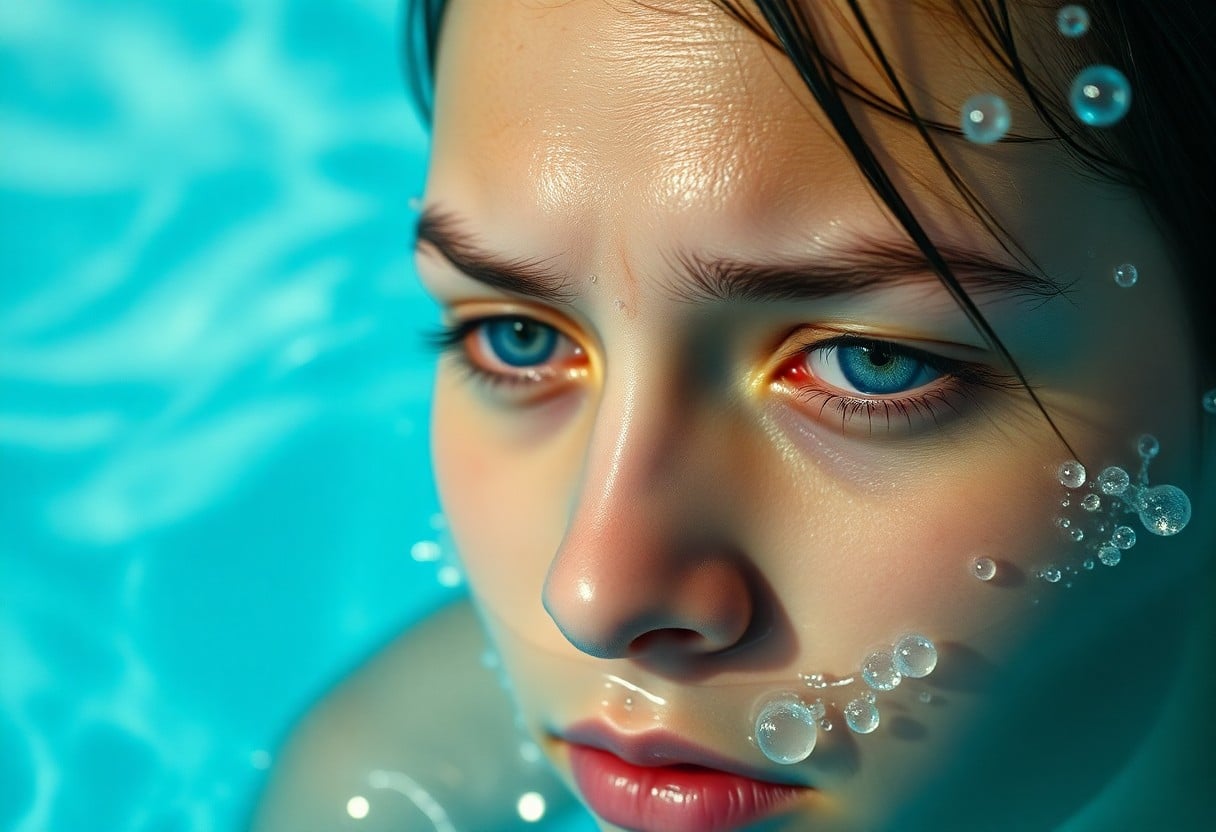Swimming is a refreshing activity, but it can sometimes leave you experiencing a burning sensation in your eyes. This discomfort can be caused by various factors, including chlorine, water quality, and even your own eye care habits. Understanding why your eyes burn during and after swimming can help you take steps to protect them and enjoy your time in the pool. In this post, we will explore the common reasons behind eye irritation in aquatic environments and provide tips on how to alleviate and prevent this issue.
The Science Behind Eye Irritation in Chlorinated Water
While swimming is a beloved pastime, many swimmers experience eye irritation, particularly in chlorinated pools. The primary culprit behind this discomfort lies in the chemicals used to disinfect water. Chlorine, while effective at killing harmful bacteria and keeping pools clean, can also create an environment that is harsh on your eyes. The combination of chlorine with organic substances in the water, such as sweat and skin cells, forms chloramines, which can further exacerbate irritation and discomfort.
Chemical Reactions: Chlorine’s Effect on the Eyes
Chlorine is a powerful disinfectant but can be detrimental to your eyes. Exposure to chlorinated water stimulates a chemical reaction that may lead to dryness and redness. Your eyes are particularly sensitive; the corneal surface can easily become inflamed, causing the burning sensation often experienced during or after swimming. This reaction occurs as chlorine disrupts your tear film, diminishing its effectiveness in protecting your eyes.
pH Levels: Balancing Act Between Comfort and Sanitation
The pH level of pool water plays a pivotal role in your overall swimming experience. Ideally, pool water should maintain a pH of 7.2 to 7.8—this range optimizes comfort and minimizes irritation. If pH levels dip too low (acidic), they can cause your eyes to sting and feel uncomfortable, whereas high levels (alkaline) might lead to additional issues, such as cloudiness in the water. Achieving a balanced pH is imperative for enhancing your swimming experience.
Keeping pH within the desirable range isn’t just a matter of comfort; it’s crucial for effective disinfection. If the water’s pH is off-balance, chlorine becomes less effective at killing germs, leading to longer-term water quality issues. When you swim in improperly balanced water, your eyes can endure the combined effects of poor sanitation and irritation, resulting in that burning sensation. Ensuring that pool operators regularly test and adjust pH levels can significantly enhance your swimming experience and comfort.


Contact Lens Complications: A Double Whammy
The Dangers of Swimming with Contacts
Wearing contact lenses while swimming can escalate eye discomfort significantly. Chlorinated water, along with bacteria and other irritants, can adhere to your contacts, leading to increased dryness, redness, and even infection. Studies have shown that the risk of eye infections can be up to 20 times higher for contact lens wearers in aquatic environments. The combination of trapped irritants and restricted oxygen can leave you with eyes that burn long after you’ve left the pool.
Prevention Strategies for Contact Lens Wearers
To reduce the risk of irritation or infection while swimming, consider wearing daily disposable lenses designed for single-use. These can be discarded immediately after your swim, minimizing exposure to harmful agents. Additionally, using waterproof goggles is a simple yet effective method to create a barrier between your eyes and the water.
Opting for daily disposable contact lenses not only eliminates the need for cleaning solutions that can exacerbate irritation but also ensures you’re swimming with a fresh pair each time. Investing in a good pair of swim goggles can further protect your eyes by keeping harmful waterborne substances at bay. If you’re dedicated to swimming frequently, consult your eye care professional about prescription swim goggles as an alternative to contacts, providing clear vision while keeping your eyes safe.
Environmental Factors: Beyond the Pool
Your swimming experience doesn’t just hinge on the pool’s chemical balance. Various environmental factors can also contribute to that burning sensation in your eyes. For instance, high pollen counts, pollution levels, and even the weather can aggravate eye irritation when combined with chlorine exposure. Other elements in your environment can further exacerbate this issue:
- Outdoor allergens (like pollen and dust)
- Pollution from urban areas near swimming facilities
- Humidity and temperature extremes affecting your eyes’ moisture
After identifying these factors, you can take steps to mitigate their impact on your swimming experience.
Allergens and Their Impact on Eye Health
Your surroundings can harbor allergens that trigger eye irritation. Pollen from flowering plants is a notorious culprit during specific seasons. Dust mites and pet dander are also common offenders, especially in indoor pools or near open-air swimming venues. If you have underlying allergies, exposure to these elements can heighten your discomfort while swimming, leading to redness and burning sensations in your eyes.
Sun Exposure: UV Radiation and Eye Sensitivity
Prolonged sun exposure while swimming increases both UV radiation exposure and the risk of eye sensitivity. Water reflects UV rays, intensifying their reach and causing more pronounced irritation in your eyes. This is especially true around midday, when the sun’s rays are most potent, making it imperative to protect your eyes from harm.
Consider that UV radiation is linked to various eye conditions, such as cataracts and macular degeneration over time. The cornea and the retina can suffer from acute exposure, leading to short-term symptoms such as burning and watering. Wearing polarized sunglasses and hats with brims can help mitigate these effects. Adequate protection includes a comprehensive approach to sun safety—these simple habits can have a significant impact on your overall eye health during and after swimming.

Symptoms and Recognizing the Severity of Eye Discomfort
Eye discomfort can manifest in various ways after swimming. Common symptoms include redness, burning sensations, dryness, and in some cases, limited vision or wateriness. You may also experience excessive tearing due to the irritation. Differentiating these symptoms helps assess whether your discomfort is merely annoying or signifies a more serious issue that requires attention.
Warning Signs: When to Seek Medical Attention
If you notice persistent pain, noticeable swelling, or signs of infection such as discharge or extreme light sensitivity, it’s time to consult a healthcare professional. Immediate medical attention is advisable if these symptoms worsen or don’t subside after a few hours.
Differentiating Between Mild Irritation and Serious Conditions
Establishing whether your eye discomfort is mild or severe involves observing several factors, including duration and the presence of additional symptoms. Mild irritation typically clears up within a few hours and can often be soothed using artificial tears or a cool compress. In contrast, conditions such as conjunctivitis or corneal abrasions may exhibit prolonged symptoms, necessitating a more thorough evaluation and treatment.
Mild irritation can often be managed at home with over-the-counter remedies, while serious conditions may require prescription medications or even more intensive treatments. Pay attention to how long symptoms last; if mild irritation persists beyond a day or two or is accompanied by increasing discomfort, seek professional advice. Keeping a log of your symptoms can also provide valuable insight for your healthcare provider, helping them to diagnose your condition more accurately.
Practical Solutions: Alleviating Eye Burn During and After Swimming
To combat the discomfort of burning eyes during and after swimming, implementing a few practical strategies can make a significant difference. From effective pre-swim preparations to diligent post-swim care, these simple methods can help protect your eyes and enhance your swimming experience. You don’t have to endure the sting and irritation when solutions are readily accessible and easy to incorporate into your routine.
Pre-Swimming Preparations: Eye Drops and Protective Gear
Before diving in, consider using lubricating eye drops specifically designed for swimming. These drops can create a protective barrier that shields your eyes from chlorine and other irritants. Pair this with a comfortable pair of swim goggles that fit snugly around your eyes, providing an extra layer of defense. Opting for goggles with UV protection also benefits your eyes if swimming outdoors, keeping them safe from harmful sun rays.
Post-Swim Care: Rinsing and Soothing Methods
After swimming, rinsing your eyes with clean, fresh water can effectively remove chlorine residues and alleviate irritation. Following a rinse, applying a cold compress or using artificial tears can soothe your eyes and restore moisture. If you experience persistent burn or redness, over-the-counter antihistamine eye drops may also provide relief. Tailoring your post-swim routine to these soothing techniques can greatly enhance your comfort and promote eye health.
For rinsing and soothing methods, a few minutes spent under clean, lukewarm water can wash away chlorine and other irritants effectively. After rinsing, the application of a cold compress helps reduce inflammation and discomfort. Consider using chilled gel eye masks or a clean cloth soaked in cold water for a soothing effect. If irritation persists despite your care routine, opt for preservative-free artificial tears to rehydrate your eyes, ensuring they are comfortable and protected in the hours following your swim.
To wrap up
Upon reflecting, if your eyes burn during or after swimming, it is often due to irritants such as chlorine or other chemicals in the water. These substances can disrupt your eye’s natural balance, leading to discomfort. Additionally, the movement of water can wash away tear film, leaving your eyes feeling dry. To alleviate this issue, consider using swim goggles for protection and ensure you rinse your eyes with fresh water post-swim. By taking these steps, you can enhance your swimming experience while minimizing any burning sensations in your eyes.
